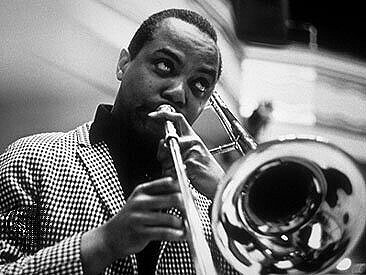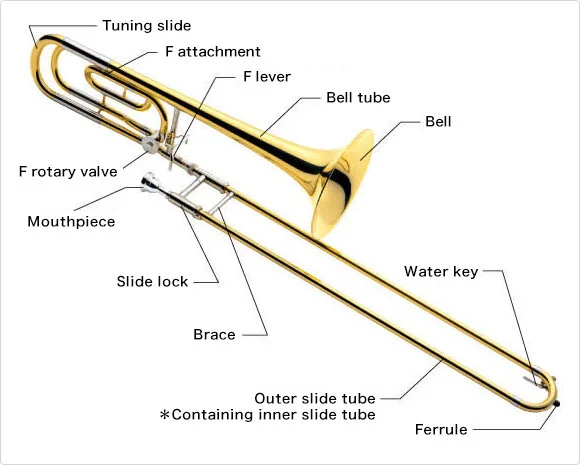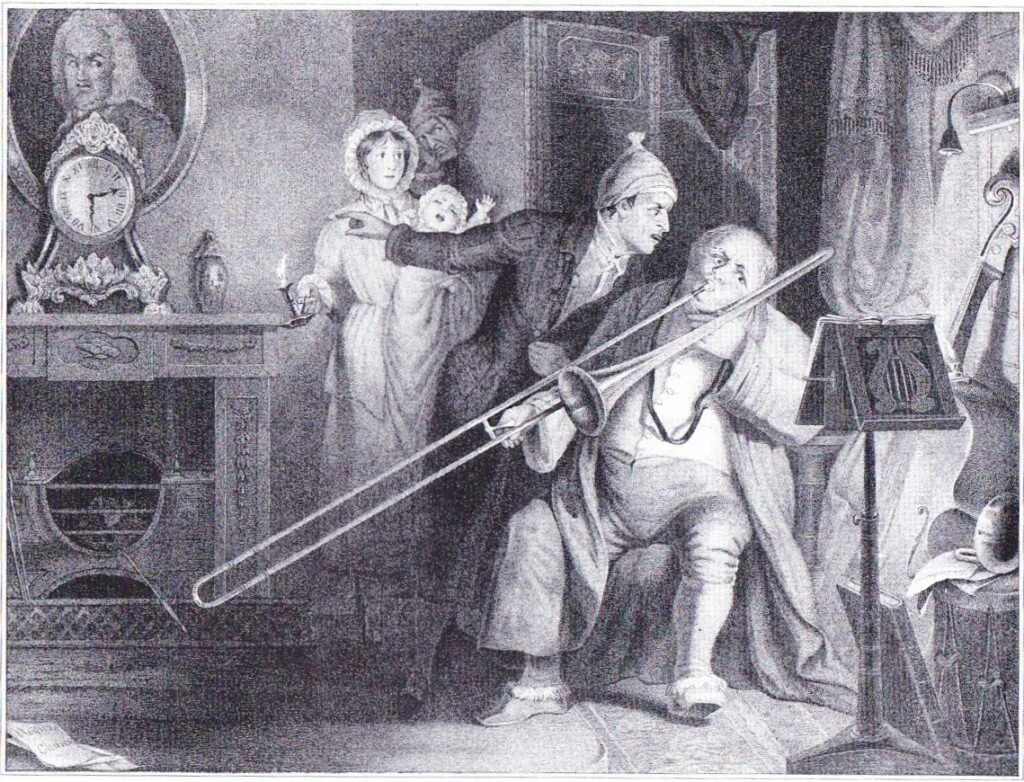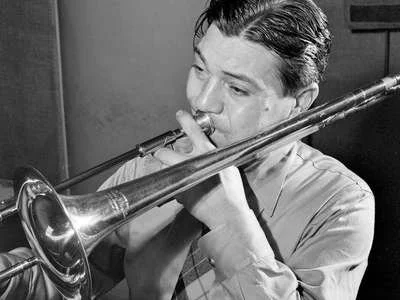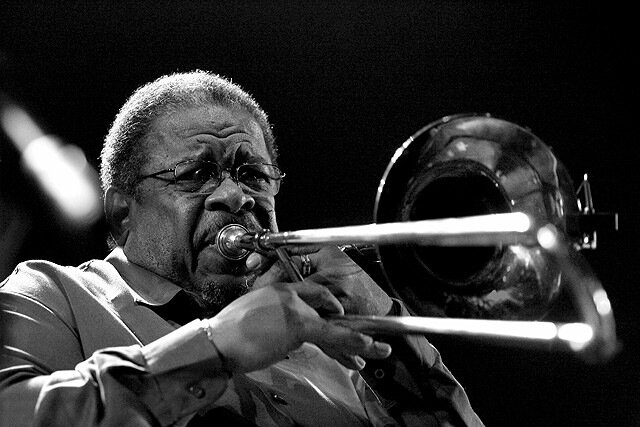By The Landlord
“The trombone is too sacred for frequent use.” – Felix Mendelssohn
“Never look at the trombones, it only encourages them.” – Richard Strauss
“The trombone is the true head of the family of wind instruments, which I have named the ‘epic’ one. It possesses nobility and grandeur to the highest degree; it has all the serious and powerful tones of sublime musical poetry, from religious, calm and imposing accents to savage, orgiastic outburst.” – Hector Berlioz
“The first time I heard Jack Teagarden on the trombone, I had goose pimples all over.” – Louis Armstrong
“Those people obviously don't know who I think I am.” – Fred Wesley Jr.
It’s the cousin of the trumpet that is often eclipsed by it, and one that, as a child, seemed to me to be like a comedy instrument, resembling a giant paperclip that made that sliding, silly, smooth rising and falling, slightly snigger-sexy, extend-it-fully-out sound.
But then as a nipper I began to love it, enjoying the playful appearances of Scottish jazz player George Chisholm who would mischievously do his thing on children’s BBC TV programmes Play School and Play Away, while regularly playing alongside different instrument jazz greats such as Coleman Hawkins, Fats Waller and Benny Carter. But as one of the oldest instruments it’s also that true, rare glissando that is one of the trombone’s strengths, and makes it special. And so, popular in everything from Rossini operas and other classical forms to marching bands, funk to jazz and pop, this week it’s time to bring the bone the fore, suggesting music and songs from any era where it plays a prominent role, centrally or with a big sound or solo.
Like the trumpet, sound comes via the player’s breath and vibrating lips, or embouchure, that causes the air column inside the instrument to vibrate. There are various sizes, but it’s the tenor trombone that is the most common, and, like the bass, set in the key in B♭ and of course it’s the slide that changes the pitch.
Trombone parts
The trombone’s reputation as a loud, brash instrument, and often as something of a joke has been fuelled unfairly in popular culture. “Never look at the trombones, it only encourages them,” said Richard Wagner, echoing that same remark by Strauss. “I don’t know why, but the trombone makes me very uncomfortable,” added Sigmund Freud, who presumably was overcome with its sexy sound and saw some kind of penile extension to its action. Fancy a bit of Slide Hampton, anyone?
“If it please your neighbour to break the sacred calm of night with the snorting of an unholy trombone, it is your duty to put up with his wretched music and your privilege to pity him for the unhappy instinct that moves him to delight in such discordant sounds,” said Mark Twain. And here in this lithograph, Enraged Neighbour, a lithograph by Bourdin after an image by Robert William Buss (1838), that anger is blown up. And for those interested in the musical element, the handle on the slide indicates this model to be a bass trombone:
Keep the noise down! Angry neighbour in a Bourdain lithograph after an illustration Robert William Buss (1838)
But for many others it is beloved. Its origins lie in the 15th century Europe with the ‘shakbusshe’, ‘sackbut’ ‘saqueboute’ and other equivalents through Germany, Spain, Italy, England and France, and with its volume was particularly popular in outdoor events in towns and cities. Claudio Monteverdi, Heinrich Schütz, Giovanni and Andrea Gabrieli composed for it in the 17th century and it’s never been away since. It became very popular in the 18th century and by then its name had changed to trombone in Britain, as well as the the Italian trombone and German Posaune.
In the later Baroque period, Johann Sebastian Bach and George Frideric Handel used trombones, and Bach called for a tromba di tirarsi to double the cantus firmus in some of his liturgical cantatas. Get him.
Christoph Gluck was the first major composer to use the trombone in an opera overture. The first use of the trombone as an independent instrument in a symphony was in the Symphony in E♭ (1807) by Swedish composer Joachim Nicolas Eggert. But it was Beethoven who gave it the full exposure in his Symphony No. 5 in C minor (1808) as well as his Symphony No. 6 in F major ("Pastoral") and Symphony No. 9 ("Choral"), so these may blast out among these week’s suggestions among a wealth of later classical compositions in the 19th and 20th centuries – from Mendelssohn to Schubert, Bartók to Britten to Bernstein, Copland to Elgar, Holst to Mahler, Dmitri Shostakovich, Sibelius, Strauss, Stravinsky and many more.
The trombone features in in many genres, pop, funk, ska and so on, but it’s likely that the most prominent of all will be jazz. So who alongside the high-profile trumpeters, saxophonists, drummers and more, slide into focus with the trombone?
Miff Mole and His Little Molers may feature as one of the great of the 1920s.
Jack Teargarden
And of course the unmissable great Jack Teagarden, who with his effortless style - played with Louis Armstrong, Benny Goodman & Glenn Miller and recorded over 1000 tracks?
Or how about J.J. Johnson, one of the pioneers of the bebop style? He started off in the 1940s in the swinging big bands and orchestras with Benny Carter and Count Basie, but then inspired by trumpeter Dizzy Gillespie, he joined the bebop train to New York, joining up with Max Roach, Sonny Stitt, Bud Powell & Charlie Parke and in the 1950s made Blue Note albums both as a bandleader and with Miles Davis. Another Blue Note great is Curtis Fuller.
JJ also influenced Kai Winding and Slide Hampton, and the latter played for 70 years well into the 21st century. Then there’s Vic Dickenson, a key part of the bands with Count Basie, Sidney Bechet and Earl Hines, and Urbie Green, who has a warm, mellow style and is known as ‘the trombonist’s trombonist’. Or you might fancy tuning into later top-classs jazz players such as Robin Eubanks and Steve Turre.
And let’s not forget the great Fred Wesley Jr, leading the funk line with James Brown? But Wesley is also a legendary R&B, soul and jazz veteran, whose musical career spans five decades.
Fred Wesley
Marching into the Bar, we’ve got many more trombonists and their fans wishing to blow their, er, trombone about it.
“A frisky spirit makes my trombone sing,” reckons Chris Barber.
Quincy Jones also adds a sexual element to the instrument. “I chose the trombone because the trombone players in the marching band got to be up front with the majorettes (because of the slides) and I loved that!” Oh yes. Slide right in there, Mr QJ!
And here’s Frank Sinatra making another huge confession. “My greatest teacher was not a vocal coach, not the work of other singers, but the way Tommy Dorsey breathed and phrased on the trombone.”
Roswell Rudd is also here, having a blast: “You blow in this end of the trombone and sound comes out the other end and disrupts the cosmos.”
As Sinatra intimated, the trombone has a particularly vocal quality. Here’s a description of 19th-century French player and key soloist Felix Vobaron:
“Mr Vobaron is an extraordinary artist on the trombone; he sings on this instrument with the sweetness of a horn, and with more good development and range. All of his skill is needed to make it forgivable to take his formidable instrument from the place it must occupy in the orchestra.” – Fétis (Revue musicale 1: 1827)
The trombone also enjoys an extra dimension with when the bell is altered. Let’s sample a great solo. Here’s one by Wycliffe Gordon from about 1.30 in this video:
And here’s contemporary crossover player Trombone Shorty who describes his intentions of style. “I’m always trying to emulate guitar. Especially when I'm playing the trombone, that's what I think about. Like, I listen to guitar players every day: Warren Haynes, Lenny Kravitz, Prince, different people. And I'm always trying to find out a way how I can get my trombone to sound like that.”
Let’s see him and his band in action at an NPR Music Tiny Desk Concert:
So from classical to Dixieland to New Orleans early jazz, swing, big band, bebop to modern jazz, pop, funk, rock, ska, son and guaracha to salsa and more, with the trombone you never quite know what’s coming round the corner:
It’s time then to slide over to this week’s guest guru, who will no doubt has also been boning up on this instrument, and is keen to hear your offerings, loud or soft - the marvellous magicman! Put your trombone suggestions into comments below until 11pm UK time Monday for playlists published next week. It’s going to be a blast.
New to comment? It is quick and easy. You just need to login to Disqus once. All is explained in About/FAQs ...
Fancy a turn behind the pumps at The Song Bar? Care to choose a playlist from songs nominated and write something about it? Then feel free to contact The Song Bar here, or try the usual email address. Also please follow us social media: Song Bar Twitter, Song Bar Facebook. Song Bar YouTube, and Song Bar Instagram. Please subscribe, follow and share.
Song Bar is non-profit and is simply about sharing great music. We don’t do clickbait or advertisements. Please make any donation to help keep the Bar running:

